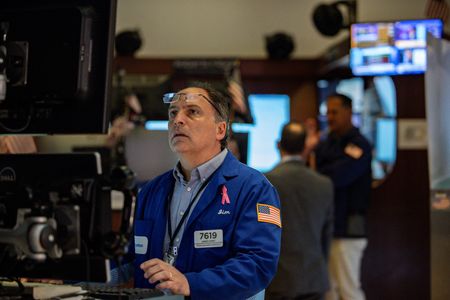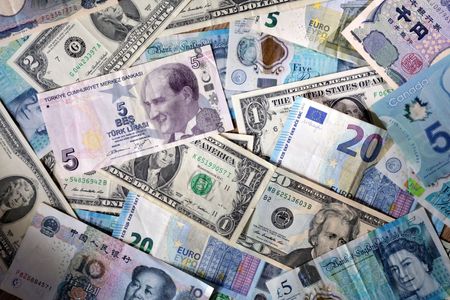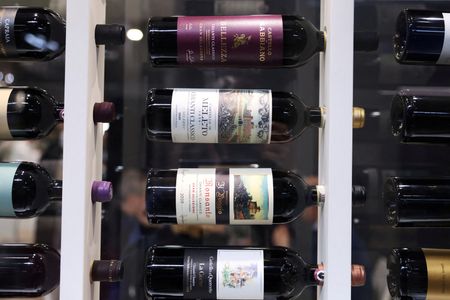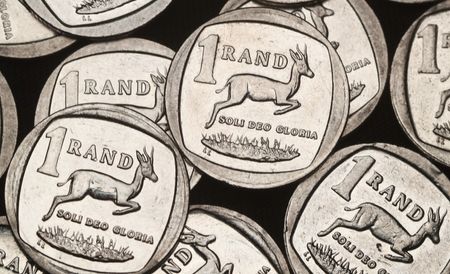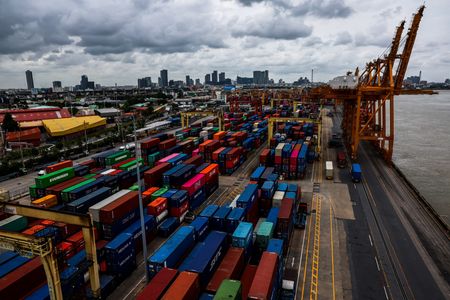By Nell Mackenzie
LONDON (Reuters) -U.S. futures pointed towards a lower Wall Street open on Monday as the latest salvo of threats in the U.S. tariff wars kept investors on edge, although there were some hopes this would prove to be mostly bluster by President Donald Trump.
S&P 500 futures and Nasdaq futures both eased 0.3%. Earnings season kicks off this week with the major banks leading the pack on Tuesday.
S&P companies are expected to have increased profits by 5.8% from the year-earlier period, down from an expectation of a 10.2% gain on April 1, according to LSEG IBES.
MSCI’s broadest index of world shares dipped 0.1% with the pan-European STOXX 600 index last down 0.4%. Other regional indexes also declined, barring the UK’s FTSE 100 .FTSE, which was up 0.4%.
Trump on Saturday said he would impose a 30% tariff on most imports from the European Union and Mexico from August 1, even as they are locked in long negotiations.
The EU said it would extend a suspension of countermeasures to U.S. tariffs until early August and continue to press for a negotiated settlement, though Germany’s finance minister called for firm action if the levies went ahead.
German 10-year government bond yields briefly hit their highest since early April on Monday after settling back to 4.60%. Yields move inversely to price.
“To use the biggest cliché in the book, it continues to be a rollercoaster ride for all of us following the trade story, even if the market has increasingly overcome its queasiness and ensured it has been well stocked up on motion sickness tablets,” said Deutsche Bank strategist Jim Reid in a note to clients.
A rise in Japanese government bond yields also added to upward pressure on borrowing costs elsewhere, said Jens Peter Soerensen, chief analyst at Danske Bank. JGB yields surged as concerns grew that an upcoming election could pave the way for increased fiscal spending.
Chinese blue chips closed 0.1% higher as data showed annual export growth topped forecasts at 5.8% in June, even as exports to the U.S. fell almost 10%. Retail sales figures, industrial output and gross domestic product are due Tuesday.
PRESSURING POWELL
In bond markets, Treasuries got a very marginal safety bid and 10-year yields held at 4.41%. Futures for the Federal Reserve funds rate edged higher as markets priced in a little more policy easing for next year.
While Fed Chair Jerome Powell has signalled a patient outlook on cuts, Trump is piling up political pressure for more aggressive easing.
White House economic adviser Kevin Hassett over the weekend warned Trump might have grounds to fire Powell because of renovation cost overruns at the Fed’s Washington headquarters.
Trump said on Sunday that it would be a great thing if Powell stepped down.
U.S. consumer prices data for June are due on Tuesday and could finally start to show early upward pressure from tariffs, though retailers still have pre-levy inventory to draw on and some companies are absorbing the costs into margins.
The impact on supply chain costs could show in producer price and import price figures this week, while a reading on retail sales will indicate how consumers are faring.
Among currencies, the euro steadied to $1.1694, edging away from its recent four-year top of $1.1830. The dollar lost 0.2% on the yen to 147.19 while the dollar index was little changed at around 97.83.
The dollar rose 0.27% against the Mexican peso to around 18.67, with Mexican President Claudia Sheinbaum confident a trade deal could be reached before the August deadline.
Bitcoin crossed the $120,000 level for the first time to reach a top around $123,153.
In commodity markets, gold picked up a modest safe-haven bid and rose 0.5% to $3,371 an ounce. [GOL/]
Oil prices rose over 1.4% on speculation Trump could announce stiffer sanctions on Russia later on Monday, including levies on major customers buying Russian oil. [O/R]
Any move from Trump wishing to arm Ukrainians more vigorously will find enthusiastic support in Congress, said Christopher Smart, founder and a managing partner of consultancy firm, Arbroath Group.
“In a famously divided legislature, there is overwhelming bipartisan support for a bill that will deliver its own sharp escalation to the conflict,” said a research note by Smart sent Monday.
The legislation threatens 500% tariffs on countries that buy Russian oil, gas, uranium or other exports, said the letter.
Brent and U.S. crude jumped just over a dollar to $71.40 and $69.48 respectively per barrel.
text_section_type=”notes”>To read Reuters Markets and Finance news, click on https://www.reuters.com/finance/markets For the state of play of Asian stock markets please click on:
(Reporting by Nell Mackenzie, Wayne Cole; Editing by Christopher Cushing and Sharon Singleton)

